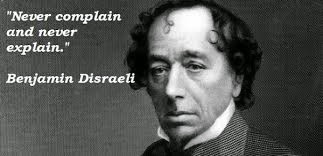SM Stirling, The Peshawar Lancers (New York, 2003).
In this novel, "...the Fall..." (p. 8) means not a moral Fall of mankind in prehistory but the physical fall of a comet or comets in 1878. Benjamin Disraeli discussed the consequences of the cometary impacts with:
Stokes, the secretary of the Royal Society;
Sir William Thomson from Glasgow;
Tait from Edinburgh;
Maxwell from Cambridge;
two others.
Since the action of the novel occurs in the second century after the Fall, Disraeli's conversation with the scientists could have been presented, for example, in a prologue or a flashback. Instead, a clairvoyant called Yasmini has the curious ability to observe several categories of events:
distant;
"...might have been..." (p. 6);
might yet be;
past.
She somehow knows that this vision is of the single past that led to her present. As a disembodied consciousness, she sees a snow- and ice-bound London, then enters a building where she not only recognizes Disraeli but also "...feel[s] the being of him, not just the appearance..." (p. 7).
By virtue of Yasmini's feeling of being and after the transitional three dots..., we now read an account that is narrated from Disraeli's point of view although we are also informed that Yasmini somehow understands "...the pure English of six generations past..." (ibid.).
This elaborate clairvoyance is not necessary to inform the reader of Disraeli's conversation with the scientists so it must instead be intended to establish Yasmini's powers in order that they can be put to further use - for espionage? - later in the novel. (However, I blog as I read so I might be mistaken.) The omniscient narrator - or, alternatively, a narrative that has temporarily returned to Yasmini's point of view - conveys something of what this extra-temporal clairvoyance feels like to her:
"It was as if her mind rode with his, a deep well full of memory and thought, where concepts and ideas rose with a darting quickness, like trout in a mountain stream." (ibid.)
I think that this means that Disraeli's mind is the "...deep well..." rather than that there is a deep well of collective consciousness within which it is possible for one mind to "ride with" another?
Several factors:
that this novel is set in a divergent timeline;
that Yasmini time travels, albeit mentally;
that she knows of events that "...might have been..." as well as of the single past that has led to her present;
that she sleeps in a cave in the Hindu Kush (p. 6) -
- might remind us of Poul Anderson's Time Patrol series. In particular, the Patrol played an elaborate trick "...in the mountains of the Hindu Kush..." -Anderson, The Shield Of Time (New York, 1991), p. 73.
A Patrol agent disguised as a Russian captain gives the lost private Garshin "'...an important object...'" (Anderson, p.14) to deliver to his superiors.
"When Garshin glanced rearward, a last time, he saw sunlight from behind the [captain's] helmet make a kind of halo, as if on an angel who guarded some place mysterious and forbidden." (p. 16)
That place could not possibly be more mysterious or forbidden because the Patrol, for purposes of its own, prevents Garshin's meeting with the captain from ever having happened. Thus, although we read an account of their conversation, we later learn that that entire encounter is a "...might have been..." and, at the end of the appropriate section of the narrative:
"Yuri Alexeievitch Garshin stumbled lost and alone." (p. 123)
Yasmini's time travel to a past mind where ideas are like trout in a mountain stream might also remind us of Anderson's account of time as "...a river..." -Anderson, Time Patrol (New York, 2006), p. 17 - that can be diverted, therefore is guarded by the Patrol. Mentally at least, Yasmini's universe of discourse is very similar to that of the Time Patrol.


1 comment:
Hi, Paul!
Fascinating, the connections and analogies you were able to make connecting Stirling's THE PESHAWAR LANCERS with Anderson's Time Patrol stories. Much food for that in that idea!
I've read PESHAWAR twice and both times I thought of the "deep well" Yasmini experienced as her contacting Disraeli's mind. And that the trout metaphor was Disraeli's quick and lively mind struggling to find ways of coping with the horrible disaster of the comets strikes which devastated Earth in the alternate 1870s.
Sean
Post a Comment